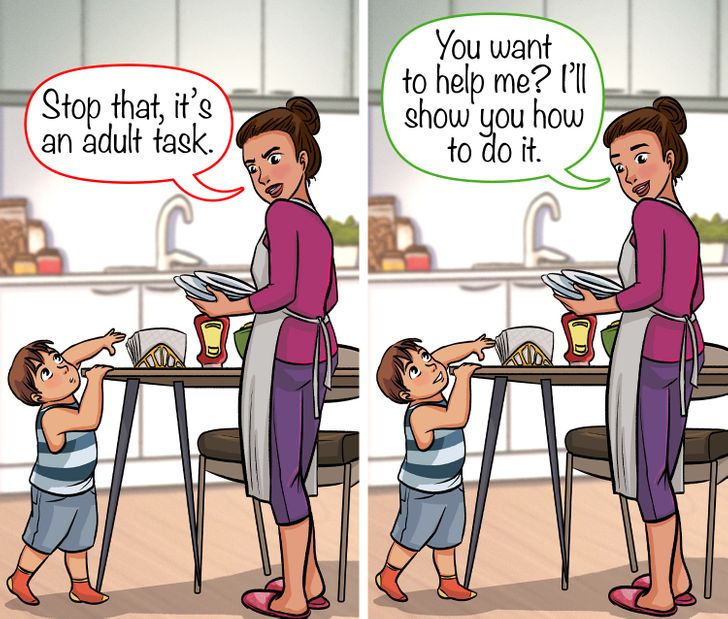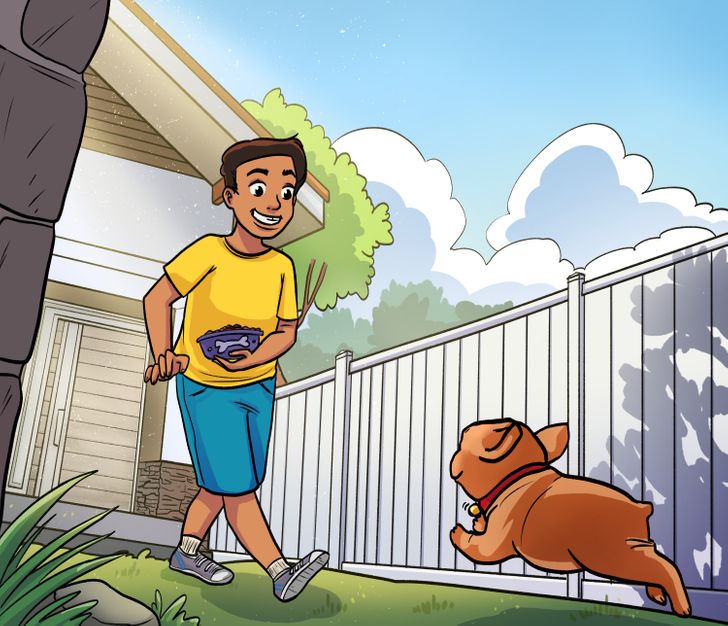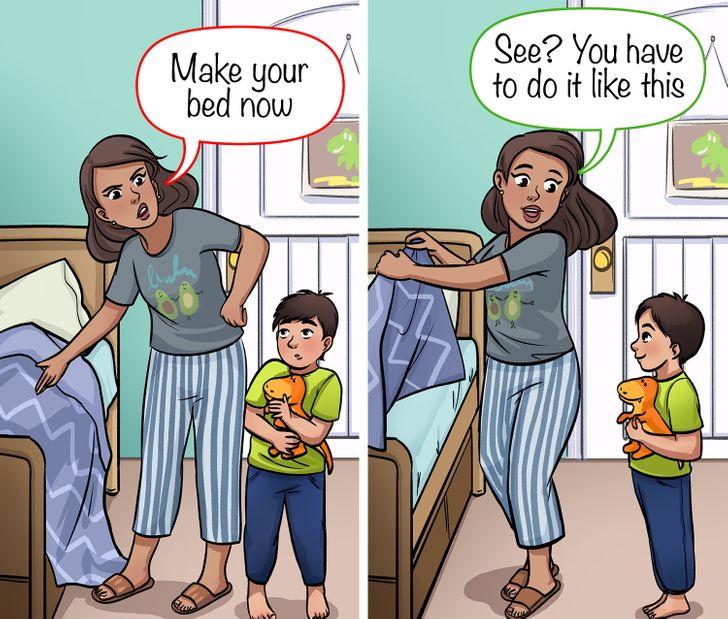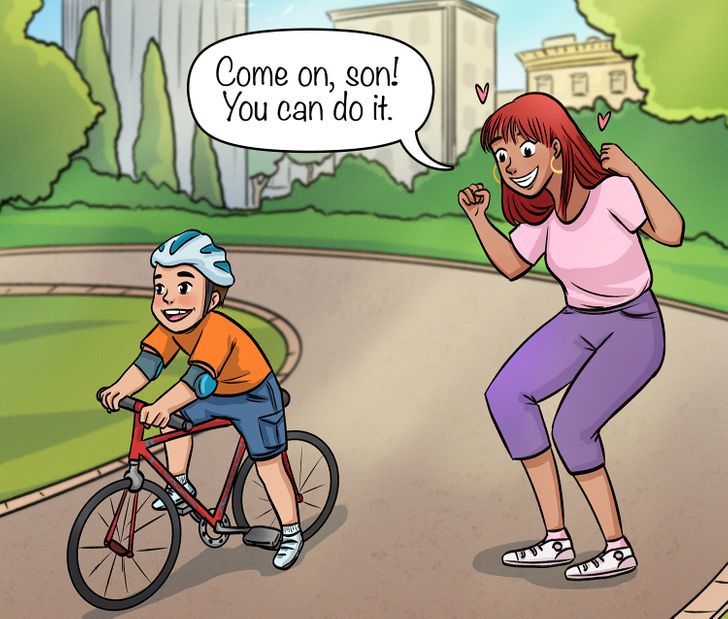What if the parents do it all, really, and the outcome is a naughty bitter dependent impolite child!. What should parents do!
10 Parenting Tips That’ll Help You Raise More Independent and Confident Children

Raising a child could be compared to a dance: sometimes it is necessary to hold them back, and other times it is better to let them go and give them freedom of movement. When it comes to raising independent and self-sufficient little people, this metaphor is very useful, since, as adults, we must serve as a guide and example for children, while trying not to suffocate them with our criticisms, demands, and fears.
To help moms and dads with the wonderful art of parenting, Bright Side has prepared this article with some tips that’ll help you make your children more independent and self-confident.
1. Don’t do things for them.

In some situations, you may be in a hurry and it may be more simple to do things yourself rather than waiting for your children to do them. But, this type of behavior can have negative consequences for the development of children’s independence in the long run. Children learn by doing and by making mistakes, so it is very important to give them the opportunity to do things for themselves and not deprive them of these learning moments. In addition, you will be fostering the discovery of self-confidence and self-assurance.
2. Celebrate their daily achievements

It can happen that we are so immersed in our daily activities that we lose sight of our children’s achievements. It is important to keep in mind that the youngest members of our family need our attention and recognition every time they achieve a goal. We are not talking about huge achievements, like winning a soccer tournament or becoming the champion of a math competition, we are talking about smaller accomplishments, like finishing a homework assignment on their own or brushing their teeth properly. If we are there to celebrate this progress, we will help them improve their self-esteem.
3. Let them help with household chores

Children can learn a lot from your experience with household chores. Getting involved helps them understand what they need to do to take care of themselves, the house, and their family. It also gives them a chance to feel responsible and competent. Of course, not all chores are suitable for all ages, here are some ideas according to the stage your children are at:
2-3 years
- Pick up toys and books.
- Put clothes on clothes hooks.
- Set placemats on the dinner table.
4-5 years
- Set the table for meals.
- Help with preparing meals (under supervision).
- Help with grocery shopping and putting away groceries.
6-11 years
- Water the garden and indoor plants.
- Take out the trash.
- Vacuum or sweep floors.
4. Let them make small decisions

Decision-making is one of the most important skills children need to acquire to become mature, healthy adults. Ideally, give them a number of choices to decide from and increase those choices as they get older. For example, if you go to the store with a 3-year-old who wants you to buy them all the treats, you could tell them that they can’t get everything, but that they do have a choice of candy, soda, or snacks.
Another good idea to encourage decision-making in our children is to let them choose the clothes they want to wear. This will help them build self-esteem, express their opinions, and make things easier for you.
5. Bringing a pet into the house

Fluffy and cuddly pets have multiple benefits for children’s development. But when it comes to bringing a pet into the house, it is important that the children understand all the responsibilities involved. Feeding the pet, for example, could be a good way for children to practice the role of a caregiver. In addition, playing with the animal can improve your children’s social skills and reinforce their self-esteem.
6. At least once a month, give them a new challenge

Facing challenges is very important for children to feel self-confident. Therefore, a good option is to propose new challenges that they are capable of overcoming according to their age, abilities, and development. For example, you can ask 3-year-olds to dress themselves, draw a picture, or sing a song.
7. Be patient and do not criticize their attempts

When we do something for the first time, we are likely to make mistakes and have to make several attempts until we get what we want. If that happens to us as adults, imagine how often it can happen to children. Therefore, it is essential that we have patience with them and praise their attempts instead of criticizing them. Constant criticism and correction will only make children form a bad self-image and feel incapable. Applied in a timely and measured manner, praise can be a great tool to enhance their self-esteem and raise confident and mature little people.
8. Teach them how to do a task so that they can learn it better

You are your children’s first teacher, so if you want them to perform a particular task, you should teach them how to do it first. Otherwise, they may get frustrated and not do it simply because they don’t know how. First, tell them what they have to do. Second, show them how to do it. And third, go through it step-by-step. In general, children learn much easier if they can see adults do things. If you lead by example, your children will feel more secure and confident and won’t feel like they’re walking down a path completely blind.
9. Listen to them and explore their fears

Fears in childhood are completely normal. However, as adults, we have to be aware of children’s fears, listen to them, and reassure them. It is key that children can confidently tell us their deepest feelings and that we let them know that being afraid is a natural part of any challenge. A good idea to placate fear is to explain how we overcame a challenge with a personal example.
10. Encourage their autonomy by showing faith in their abilities

This point can be summed up in one simple sentence: If you believe they can do it, your children will believe it too. We are used to leading the way, teaching, and guiding our little ones. We might even think that it is the children who have to trust adults and not vice versa. But yes, we should trust them more in their strengths and desires and, moreover, transmit to them our faith in their abilities. This is the best way to raise confident people with a strengthened self-esteem.
And you, what techniques do you use to help your children become independent and self-confident? Tell us about your experience in the comments so that we can all learn from it.
Comments
my mom does it differently. She always complains that no one helps her with cleaning up but when you come and offer to help, she says she doesn't need help
Related Reads
14 Logical Riddles That Can Keep You Up All Night

11 Illustrations That Prove What We See on Social Media Is Nothing but an Illusion

14 Stories That Prove Kindness Is the Most Powerful Force on Earth

15 Stories That Capture the Bittersweet Journey of Blended Families

I Refuse to Let My Parents Use My Success Story After They Called Me a Failure

I Refused to Be My In-Laws’ Emergency Motel—Snowstorm or Not

18 Stories Where Kindness Made It Human Again

I Refused to Let My MIL Own My Family Budget, Now My Marriage Is on Thin Ice

My Family Always Prioritized My Sister—Then Expected Me to Help Them With Medical Bills

19 Stories That Prove Money Is the Ultimate Truth Serum for Relationships

12 Moments That Show Romance Is Really About Small Acts of Kindness

12 Moments That Teach Us to Choose Kindness Even When Life Turns Unfair
